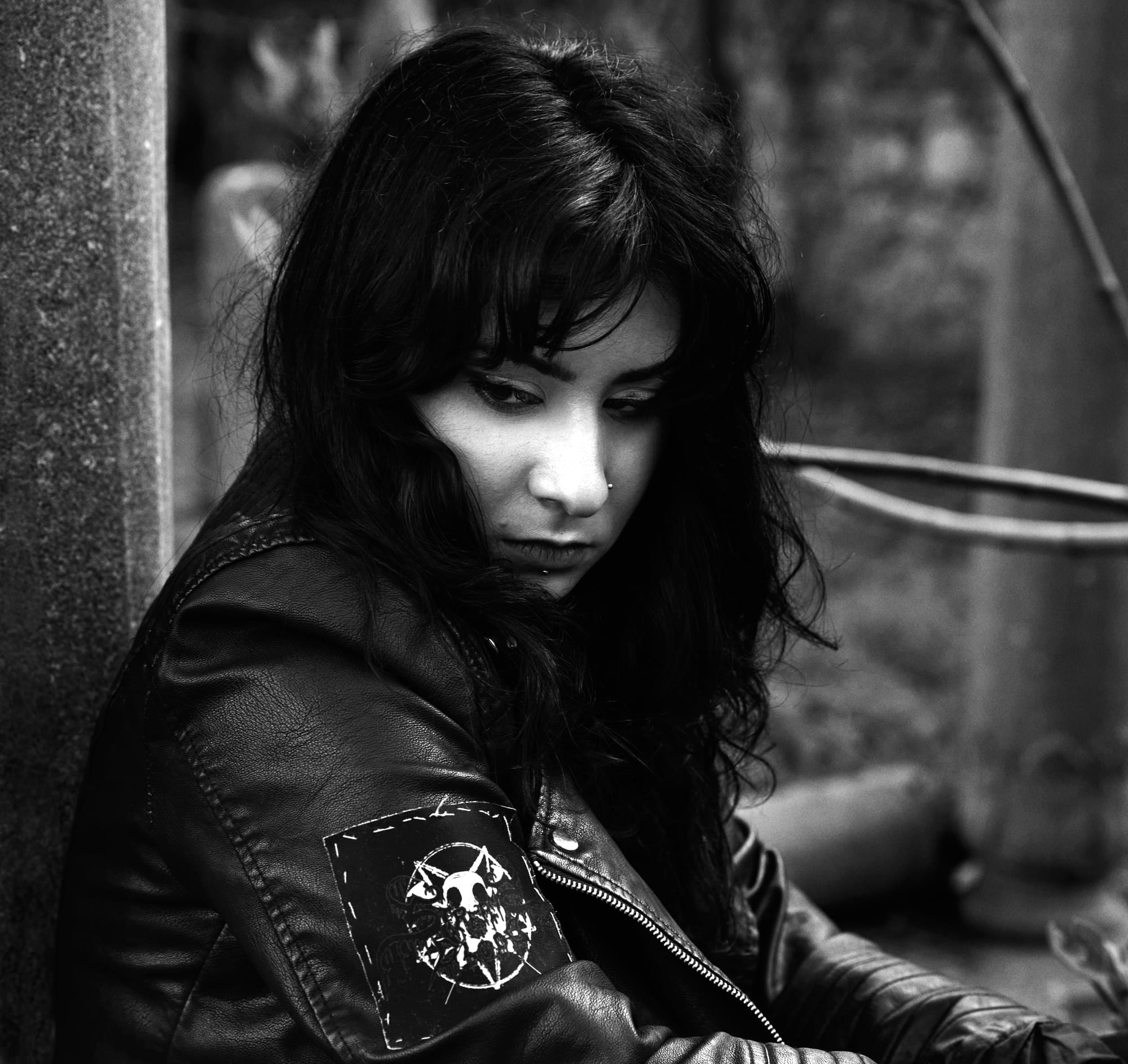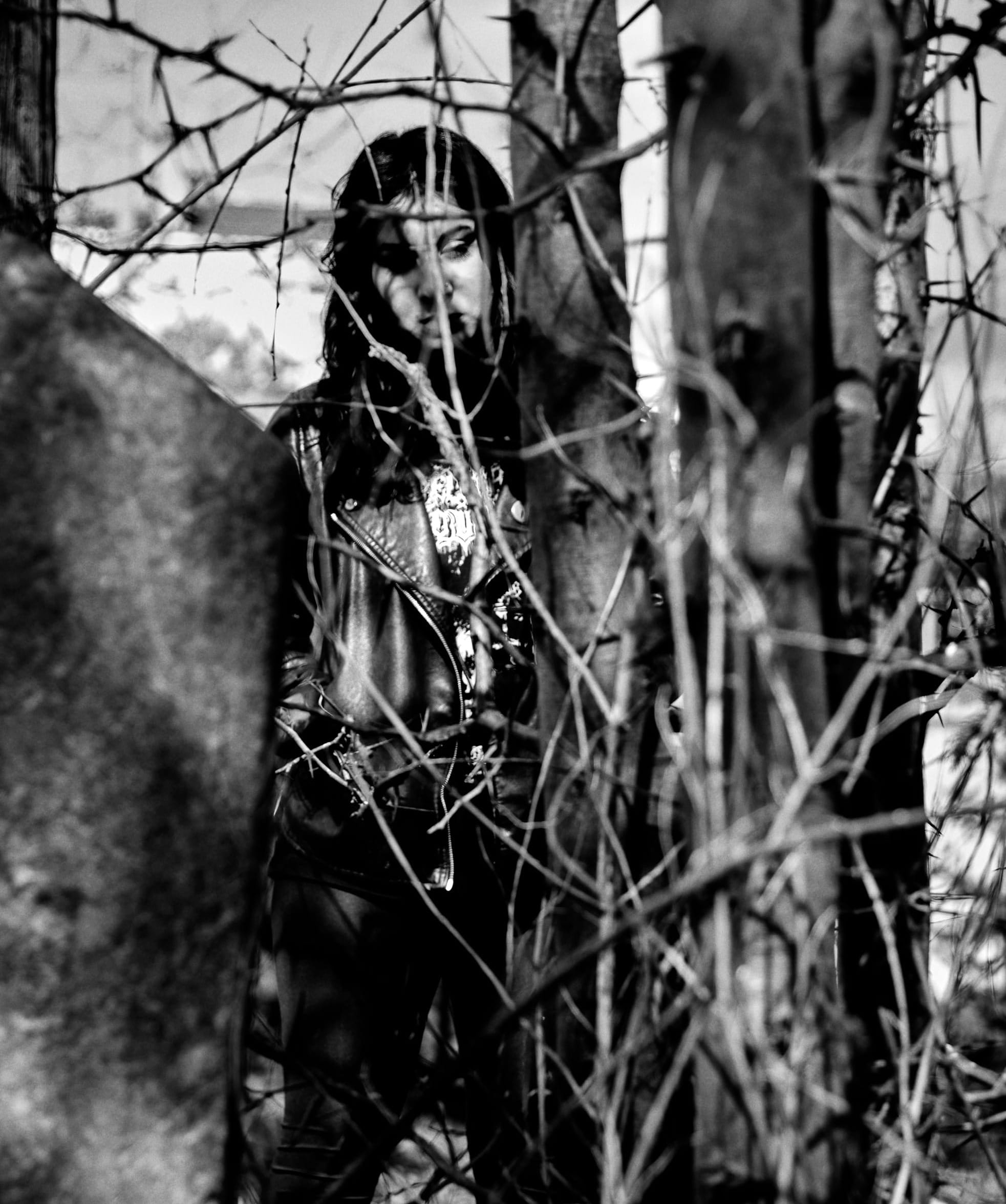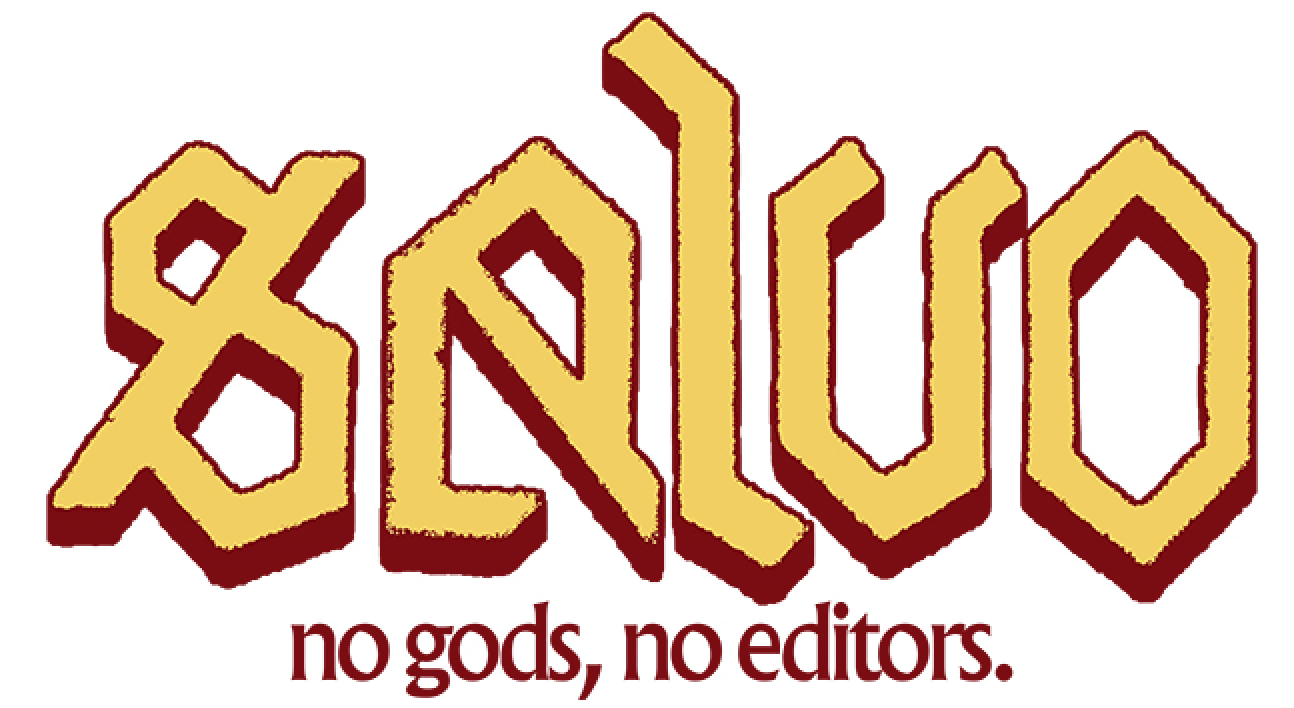Xwîn's Raw Kurdish Black Metal Is Rooted in Rebellion
"Ignoring the political aspects of life—especially when they shape the very world black metal exists in—is to miss the point entirely."

I don't listen to as much music as I once did. For many years, I listened to metal (and a few other genres, sometimes, but mostly metal) all day, pretty much every day, through shitty headphones at work or live at venues and bars or on my turntable at home. As a full-time music journalist, it was literally my job to absorb as much new music as humanly possible; the fact that I loved doing it was just a perk.
Now that my work life revolves around a different (though sometimes overlapping) sector of the universe, I've had to turn the volume down a bit to concentrate—and since I also now share my life with a vintage NYHC hooligan who refers to metal as my "whiny guitars," the soundtrack to our common spaces tends to be carefully negotiated. I still go to shows and festivals when I can, but conferences and reporting trips and picket lines and book events eat up the lion's share of my schedule. Metal still means the world to me, but my own world has changed.
That being said, when I stumble across a new artist or album that really, really grabs me, it feels extra special. Last year, when an EP by Xwîn popped up on the Antifascist Black Metal Network and found its way into my feed, I expected to hear something at least a little different—the Kurdish song titles were a dead giveaway that it wouldn't be generic Norsecore—but couldn't have predicted just how deeply I'd fall under Xwîn Bi Xwînê Tê Şûştin's spell.
Raw black metal has been one of my dearest loves since I was a teenager, and Xwîn's interpretation of the format felt fresher and more vital than anything I'd heard in years. The genre's usual hallmarks were there—the lo-fi production, the frenetic chromatic riffing, the pervasive atmosphere of suffocating chaos—but there was more to it, buried in the sepulchral vocal samples and distorted ululations. Once I dug a little deeper and learned more about the project and the artist behind it, it all made perfect sense.
The force behind the band is a young Kurdish woman named Helin, who also uses the nom de guerre Graveyard Slut in several of her many other projects. That 2024 Xwîn Bi Xwînê Tê Şûştin EP was her very first release under the Xwîn banner, and it made a powerful statement. To both her and my knowledge, it is the very first Kurdish language black metal album ever (if you know differently, please drop me an email!). I've followed the Kurdish liberation struggle and Rojava revolution for many years, and was thrilling to come across such a visceral piece of black metal art that was so heavily and intentionally influenced by that culture of resistance.
Black metal as both an art form and a global subculture likes to talk a big game about rebellion, but the sentiment hits way harder when its being expressed by a member of a historically and violently oppressed ethnic minority group whose homeland is perpetually under attack by imperial powers, and whose culture and language has been criminalized by an authoritarian dictatorship. (Keep that in mind next time you see an reactionary American black metal chud crying about being "cancelled" on social media!). Not only is Xwîn a thousand times tougher than them, it's lightyears better in terms of quality, too—and we've still only heard their first six songs!
I just had to know more. Helin was kind enough to answer a few questions about the album, Xwîn, and her inspirations for the project; our email exchange has been lightly edited for clarity and considerations for her safety.
SALVO: For those who aren't yet familiar with Xwîn, could you tell me a bit about how it came together, and your inspiration for starting this project?
HELIN: The idea for this project actually goes back a few years—around 2 to 3 years, to be precise. It initially started as a concept I shared with a relative of mine, who’s a very talented young individual. He even has his own project called DryRot, which he started at just 15 years old. I think that deserves some attention as well!
At the time, we brainstormed the idea together, but due to his busy schedule and the fact that we live in different cities—he’s based in Diyarbakır—it wasn’t possible to collaborate actively. So, after some time passed, I decided to take the idea and bring it to life myself.
The inspiration behind Xwîn comes from multiple places, but primarily from the history and experiences of the Kurdish people. As a community, we’ve faced tremendous oppression, even genocide, throughout history, and unfortunately, anti-Kurdish sentiments persist to this day. Yet, despite these hardships, the Kurdish people have preserved their identity and resilience. That duality of suffering and strength deeply resonates with me.
Another important reason for starting Xwîn is that I’ve never come across a black metal record in Kurdish before. If it exists, I haven’t seen it. I felt this absence deeply and believed that it needed to exist. The themes tied to Kurdish history and resistance felt like a natural fit for the essence of black metal—a genre rooted in rebellion and defiance.
As the ideas for the project began to take shape, I became more and more determined to make it a reality. Eventually, I decided to start working on it alone, and I think it turned out really well.
The Xwîn Bi Xwînê Tê Şûştin EP was your first release under the Xwîn name, and the title immediately caught my eye. As you mentioned, it's rare to see Kurdish used by a metal band—particularly one based in Türkiye, where Kurds and the Kurdish culture is so brutally repressed. Can you tell me about your connection to the language?
My connection to the language is rooted in my identity—I’m Kurdish. But the truth is, I don’t actually speak Kurdish fluently yet. I’ve only recently started learning it because, as a people, we’ve been heavily assimilated. There are so many young Kurds, myself included, who grew up not speaking the language. It’s a reflection of the larger cultural repression we’ve faced.
When it comes to using Kurdish in metal, I realized there was a huge gap. To me, Kurdish itself is inherently ‘metal.’ It carries so much weight, history, and resilience—it just fits perfectly with the spirit of the genre.
All the inspiration I needed was right in front of me. I didn’t have to look far to find material that was rich, raw, and powerful. It felt natural, almost like a map laid out before me, telling me, ‘This is the path you should follow.’ Working with these themes and this language was also exciting because it’s so unique, untouched in this context. It gave me the freedom to explore and create something completely original. That’s what drove me to use Kurdish in Xwîn.
What is that sample at the beginning of "Azadîya Binaxkirî"? What's being said, and in what context? How does that fit into the rest of the song?
Thank you for asking. The sample at the beginning of “Azadîya Binaxkirî” is taken from a documentary about Kurdish women in the mountains. The segment features a traditional Kurdish practice where a verse or chant is recited, followed by the phrase “Çal Kekê,” which loosely translates to “Play, brother.” It’s a call to play a rhythmic instrument or create a musical moment. The part I used reflects the deep cultural and communal traditions of Kurdish people.
Additionally, the second riff incorporates a zılgıt (a traditional ululation often performed by Kurdish women) to further root the track in Kurdish cultural expression. Both the sample and the zılgıt felt like essential elements to authentically connect the song to its thematic and cultural inspirations.
You also handle the mixing and mastering duties for most of your projects (do you ever sleep?). Do you have a background in audio production, or is it all DIY? For example, Xwîn Bi Xwînê Tê Şûştin is quite raw, but it's clearly intentional and well-executed.
Thank you for your interest in the album. I learned everything by trial and error. It’s been about two and a half years since I started making music, and a lot has happened in that time. I didn’t know anything at the beginning, which is evident in my older recordings. I’m still learning, and I’m really happy with the DIY approach because it taught me a lot, and I believe it’s been satisfying for people who are looking for something in this realm.
Your other projects like Ash Magick and Crawling tend to deal with more esoteric, occult, or morbid themes, but even just using Google Translate, I can tell that Xwîn is different—"Buried Freedom" and "Blood is Washed Away by Blood" feel all too real. Can you tell me more about the lyrics and message of this EP?
Xwîn, in a sense, carries a more raw and immediate message compared to my other projects. While Ash Magick and Crawling delve into themes of the esoteric, occult, and morbid, Xwîn is deeply connected to real-world struggles, especially regarding the Kurdish experience. The EP’s title tracks reflect the harsh realities and suffering that continue to affect the Kurdish people, touching on themes of oppression, violence, and the fight for survival.
The messages are intended to highlight the enduring nature of these struggles, and the rawness in the lyrics comes from a personal place—it’s not just a commentary on history, but an ongoing issue that is all too real and present in the lives of many. The music is very much a reflection of that intensity, and it’s meant to evoke not just emotion but a sense of urgency and resistance.
What should people in the U.S. know about the conditions facing Kurdish people in Türkiye and elsewhere in the region? Americans are told that the Kurds are our allies, yet our government continually abandons and smears their efforts at self-defense and self-determination. What can people abroad do to support their liberation struggle?
This is a complex and deeply rooted issue that spans decades, and it’s difficult to summarize fully. But I think what’s most important for people to understand is the systemic challenges and cultural erasure Kurdish people face. In Türkiye, and across the region, Kurdish identity has been marginalized—through restrictions on language, culture, and political representation. For many Kurdish people, even practicing their culture or speaking their language has been a form of resistance.
As for supporting the liberation struggle, I think raising awareness and educating oneself is a good starting point. Understanding the historical and political context—without oversimplifying it—is crucial. Listening to Kurdish voices, amplifying their stories, and standing against oppression in all its forms are ways people abroad can contribute. It’s also important to approach these issues with nuance and solidarity, rather than treating them as abstract geopolitical matters.
So many black metal bands like to pretend that it's possible to "keep politics out of black metal," yet for many people, existing at all—or speaking one's own language—is a political act. What is your take on this view?
First of all, I don’t think it’s possible to separate anything from politics—let alone something like black metal. Everything in life is inherently political, whether people want to admit it or not. And in my case, even my existence is a political matter. So how could I not reflect that in my music? To create music that ignores this reality would feel dishonest.
As for the idea that black metal can or should be ‘apolitical,’ I think it’s a naive and self-serving fantasy. Black metal has always been about confronting reality, not hiding from it. People who claim otherwise are simply closing their eyes to the truth because it’s more comfortable that way. Black metal has always been about challenging norms, embracing darkness, and facing reality head-on. Ignoring the political aspects of life—especially when they shape the very world black metal exists in—is to miss the point entirely.
For me, black metal is a vehicle to express the reality of my existence, my struggles, and even the history of my people. To pretend otherwise would be to deny a fundamental part of what this genre can and should represent.

You're an extremely prolific artist, with several other extreme metal bands as well as a power electronics project. I'd love to hear more about your musical background; how did you first become interested in black metal and noise? What were the first few bands that really caught your attention, and made you want to devote your time to creating harsh music of your own?
It’s hard to pinpoint exactly how my interest in black metal and noise started because I’ve been into metal since I was a kid. From the moment I discovered black metal, it just clicked with me. I was drawn to it immediately, and I’ve stayed within that realm ever since. I’ve always loved exploring and learning, especially when it comes to art, and I think that curiosity naturally led me to black metal and underground music.
Noise was a similar experience for me. I found it fascinating because it was so extreme, unlike anything I’d encountered before. It pushed boundaries in ways that excited me. When I realized there weren’t any prominent power electronics projects nearby—or at least none that I’d come across—it motivated me to start my own. It wasn’t just about filling a gap but also about pursuing something I genuinely wanted to create and experience.
In terms of the bands that inspired me, early on I was captivated by the rawness of first-wave black metal. Bands like Darkthrone and Urgehal had a massive impact on me, especially their raw recordings, and I loved raw black metal in general. These bands influenced not just my musical taste but also how I approach making music.
You recently started yet another new project, Hexenaught, this time with a collaborator in Finland. What can we expect to hear from that project, and how did it come about in the first place?
Hexenaught is the first project where I had the chance to work with a real drummer. I recorded the guitars and vocals here, while the drums were recorded in a studio in Finland. The EP itself came together pretty spontaneously—it was a quick production, something we wanted to release by summer, and we did. It wasn’t a project we spent extensive time perfecting, but it served as a great starting point.
I see Hexenaught as something that will grow and develop over time, evolving alongside my own progression as a musician. The project has a lot of potential, and I’m confident it will continue to build on itself. Personally, I want Hexenaught to lean into chaos, both musically and conceptually. Ozan, my collaborator, wants to explore the feminine energy of the project, but in a chaotic and destructive form—something along the lines of Kali or other fierce, transformative symbols of feminine power. Our logo, for example, features two angels, and I feel this reflects the kind of duality and intensity we want to channel into the music.
Stylistically, Hexenaught carries the old-school Kadıköy metal sound while also bringing in Ozan’s perspective as a drummer rooted in that tradition but now based in Finland. This combination is part of what makes the project special. It’s still early days for Hexenaught, but I have high hopes for what we can create in the future. It’s going to take hard work, of course, but I believe we can push the boundaries and create something truly remarkable. For now, we’ve laid the foundation, and I’m excited to see where it goes from here.
Finally, what is next for Xwîn?
A full-length album will definitely come, but not anytime soon. Right now, I’m focused on Ash Magick’s new album, which will be released under Apocalyptic Witchcraft Recordings this year. I want the full album to be built on a solid foundation, just like the EP. I’d like to work on it with care and dedication, which means I need time—and beyond that, inspiration. Inspiration is crucial because my work is very thematic. I can’t just record some riffs and throw them into the world for a project like this. I need to draw inspiration, do research, explore, and immerse myself in the culture to create something meaningful for the album.
But rest assured, a full-length will come eventually, and I believe it will meet expectations. When the time comes, I’ll dedicate myself fully to the process and ensure it’s something that resonates with the themes and energy of the project.
+
Stream 'Xwîn Bi Xwînê Tê Şûştin' here, and keep up with Helin's other projects via Bandcamp (they're linked within the interview, alongside a number of resources on the Kurdish freedom struggle and the Rojava Revolution). And subscribe to Salvo for more writing on truly rebellious black metal art!

